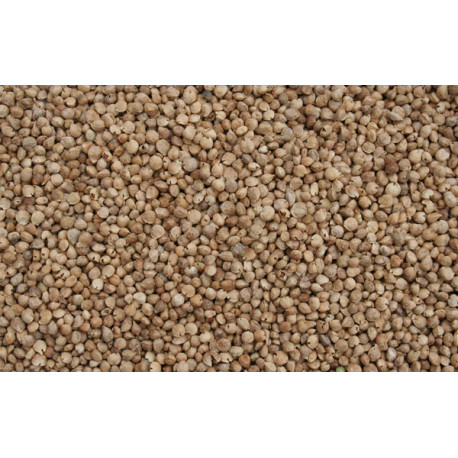- In the process of being restocked




Reference: 162303-1KG
Spinach seeds contain vitamins A, B1, B2, B3, B7, B9 and C, mineral salts and trace elements. Regular consumption helps to strengthen the feathers.
Spinach seeds contain vitamins A, B1, B2, B3, B7, B9 and C, mineral salts and trace elements. Regular consumption helps to strengthen the feathers.
Turnip is almost similar to rapeseed, the difference is the more bitter flavor of the latter. Turnip seed is rich in protein and favourable to the improvement of song, so it is interesting during the breeding season in canaries.
A type of seed with a mild taste and high protein content. They are also high in fat.
This seed is quite fatty, we advise you not to exceed 10% of your shuttle mix for colored canaries or posture canaries.
For singing canaries, the shuttle softens the song and can therefore be used at 30% of the mixture: in the latter case, we advise you to accompany your bird's diet with liver support.
Thanks to its small black seeds or a pretty electric blue, the poppy is recognizable among a thousand. A cousin of the poppy, the poppy is renowned for its content of healthy fats and micronutrients essential for the proper functioning of the body.
Flaxseed is rich in omega 3, which is essential for the cardiovascular system.
Aleppo pine seeds (large) for parakeets, parrots, crossbills... is a natural pine seed, a delight for your birds, this seed also has therapeutic virtues, it can be added to the seed mixture or in a separate feeder.
Paddy rice seed or raw rice which is perfect for exotic big-beaked birds such as padda and birds of Asian descent. This seed is also appreciated by parakeets, parrots and exotic doves.
Extra wheat, very good quality, for all types of birds and ornamental animals, pigeons, chickens, parrots, parakeets, doves...
Paddy Rice 20kg - Versele-Laga
Paddy rice seed or raw rice that is very suitable for exotic birds with strong beaks such as padda and birds of Asian origin. This seed is also appreciated by parakeets, parrots and exotic doves.
Foniopaddy Seed is a natural grass seed grown on our plantations in Uganda. Scientific research has shown that Foniopaddy has a beneficial effect on coccidiosis.
High-quality seeds with high fat content
- With a high content of vitamin E, B9, B5, B6, B1, B2, B3, and vitamin K.
- It has antioxidant properties.
- Excellent energy contribution.
- Rich in calcium, potassium, magnesium, phosphorus, proteins, zinc, thiamine, pectin (cleanses the body).
The canary seed is a grass, an annual plant up to 1m tall, the seeds being found in the inflorescences. These seeds represent a significant fraction of the majority of bird mixtures.
• Excellent for canaries, European and exotic birds, wavy parakeets and large parakeets.
• EXTRA canary seed has undergone extra cleaning and is of exceptional quality. Unique on the market!
Chicory seeds (cichorium intybus) are among the health seeds that come from wild plants. These seeds are rich in fiber and minerals and help maintain intestinal balance.
They purify the body and are also effective in cases of indigestion.
Seeds for canaries and exotic and native birds.
Birds like to remove the shells from peanuts and then eat the peanuts. Peanuts are a source of energy, which is very important for the long winter months.
Unpeeled peanuts can be given to parrots as a treat.
Grass seed is very low in fat, it is ideal for small exotic birds and siskins, but it is suitable for all birds.
The green Pagima ensures the good health of your birds. Pagima green promotes the functioning of the intestines, thus ensuring better digestion. Pagima is also credited with a preventive action against inflammations of different types that threaten your birds, it is rich in vitamins and fiber, its smell is pleasant and its taste delicious.

Spinach seeds contain vitamins A, B1, B2, B3, B7, B9 and C, mineral salts and trace elements. Regular consumption helps to strengthen the feathers.
